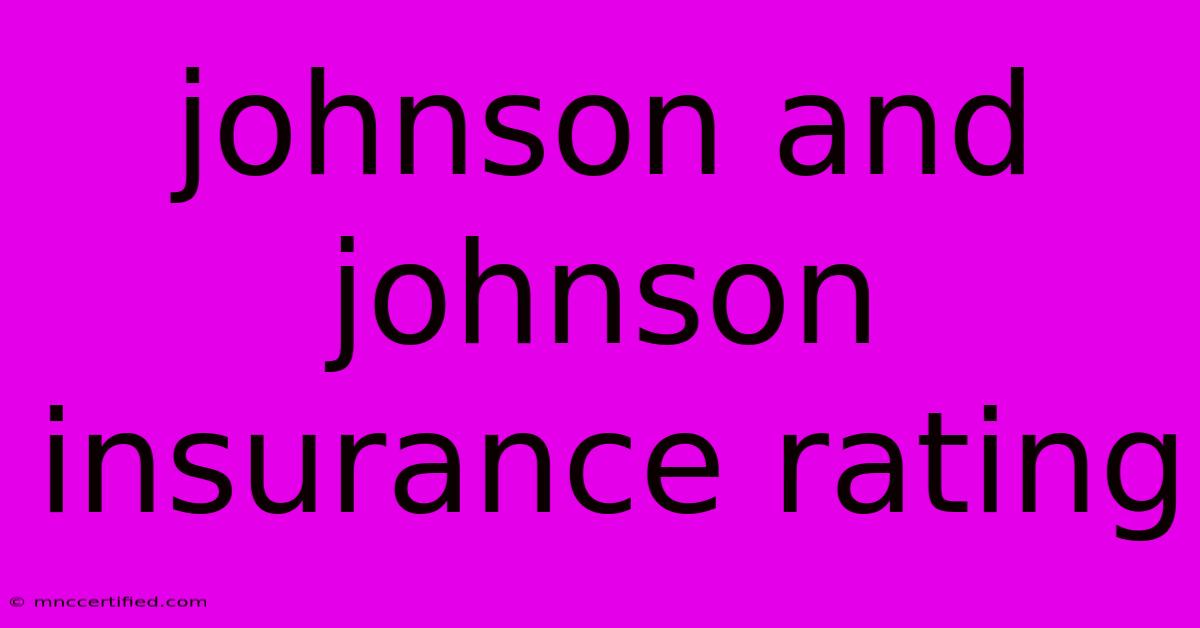Johnson And Johnson Insurance Rating

Table of Contents
Johnson & Johnson: Unpacking the Insurance Giant's Financial Health
Johnson & Johnson (J&J) is a name synonymous with healthcare, but did you know they also have a significant insurance arm? This article dives into the financial health of Johnson & Johnson's insurance operations, exploring its ratings, performance, and what it means for investors and policyholders alike.
Understanding Insurance Ratings: A Guide for Consumers
Before delving into J&J's specific ratings, it's essential to understand what these ratings mean. Insurance companies are assessed by independent rating agencies like A.M. Best, Moody's, and Standard & Poor's. These agencies examine various factors, including:
- Financial Strength: This encompasses the company's capital reserves, profitability, and ability to meet its financial obligations.
- Operating Performance: Analyzing underwriting performance, management quality, and overall business strategy.
- Risk Management: Evaluating the company's risk appetite and its effectiveness in managing potential losses.
These assessments are then translated into letter grades, with higher grades indicating stronger financial health and lower risk for policyholders.
Johnson & Johnson's Insurance Rating: A Strong Track Record
Johnson & Johnson's insurance operations are primarily focused on providing workers' compensation insurance through its J&J Insurance Company subsidiary. This subsidiary has consistently earned high ratings from the leading agencies.
- A.M. Best: J&J Insurance Company holds an A+ (Superior) financial strength rating, indicating excellent capacity to meet its insurance obligations.
- Moody's: The company boasts a Aa2 rating, signifying a high level of financial security and a very low risk of default.
- Standard & Poor's: J&J Insurance Company holds an A+ rating, signaling strong financial health and a solid ability to meet its commitments.
These consistently strong ratings paint a picture of a financially stable insurance provider. This stability is crucial for both policyholders and investors.
What Strong Insurance Ratings Mean for Policyholders
High ratings from reputable agencies offer reassurance for J&J's insurance policyholders. It translates to:
- Financial Stability: A strong guarantee that the company can fulfill its financial obligations, including paying claims.
- Low Risk: Lower probability of the insurer failing to cover policyholder claims.
- Confidence: Knowing that your insurance is backed by a financially secure company fosters peace of mind.
Implications for Investors: A Solid Foundation for Growth
Investors also benefit from Johnson & Johnson's strong insurance ratings. It signifies:
- Reduced Risk: Lower probability of investment losses due to financial instability.
- Sustainable Growth: A strong financial foundation enables the company to invest in growth opportunities, potentially leading to increased returns.
- Stronger Business Operations: Financially healthy insurance operations contribute to overall company stability and profitability.
Key Takeaways: Assessing the Overall Picture
Johnson & Johnson's insurance operations are a crucial part of its diverse business portfolio. The consistently high ratings from leading agencies demonstrate their financial stability and commitment to meeting both policyholder and investor expectations.
For policyholders, these ratings provide a sense of security and reassurance that their insurance needs will be met. For investors, they offer a solid foundation for future growth and potential returns.
Remember: It's always crucial to research and compare different insurance options before making a decision. This article serves as a general overview of Johnson & Johnson's insurance operations and its ratings, but further research and personalized analysis are essential for individual needs.

Thank you for visiting our website wich cover about Johnson And Johnson Insurance Rating. We hope the information provided has been useful to you. Feel free to contact us if you have any questions or need further assistance. See you next time and dont miss to bookmark.
Featured Posts
-
Yellowstone Season 5 Part 2 Guide To The New Episodes
Nov 11, 2024
-
Combined Single Limit Auto Insurance
Nov 11, 2024
-
Resume For Insurance Claims Adjuster
Nov 11, 2024
-
Goffs Unthinkable Play 10 Stats Revealed
Nov 11, 2024
-
Bill Meador Insurance Agency Reviews
Nov 11, 2024